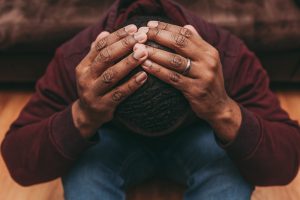The Hidden World Of Depression In The Black Community

[ad_1]
From major depressive disorder to perinatal depression to bipolar disorder, the black community is affected by depression just as much as any other ethnic group. However, they are less likely to seek treatment, often suffering in silence. Why is this? What is being done to support the African American youth who are most vulnerable? Why are black men inadvertently targeted? This is a complex issue that can be corrected with awareness and education about the realities of mental health and depression.
About Depression
Before learning more about how this medical condition affects the African American population, it’s important to understand depression, its symptoms, and how it is typically treated. Depressive episodes can be life-altering and, in some cases, life-threatening. If you feel you are experiencing a major depressive episode, please reach out to someone immediately. You can reach the emergency mental health hotline by dialing “988” or there is a list of resources at the bottom of this article, should you need them.
Types of Depression

Like most mental health conditions, there are many types of depression or related disorders that one may experience. Each may present mild to severe symptoms with depressive episodes ranging from a few days to several months or even years. Below are a few more common mood disorder types that may experience depression.
- Clinical Depression: This is also called major depressive disorder or major depression. Typically, depressive episodes last at least two weeks. Symptoms occur on most days each week. There are several types of clinical depression, and you may experience additional symptoms of anxiety, melancholy, or agitation.
- Persistent Depressive Disorder: If severe symptoms last two years or longer, your diagnosis will change from major to persistent depressive disorder. Medications like selective serotonin reuptake inhibitors (SSRIs) are usually essential to treatment.
- Bipolar Disorder: Besides major depression, those with bipolar disorder experience periods of mania or hypomania. These mood swings can be managed with mood stabilizers. Some older treatments, like lithium, may cause thyroid problems.
- Premenstrual Dysphoric Disorder (PMDD): If premenstrual syndrome (PMS) becomes more challenging and is accompanied by more depression than usual, it’s likely PMDD or premenstrual dysphoric disorder. Women may experience more anxiety and irritability than is expected as well.
- Perinatal Depression: Also called postpartum depression, many mothers experience severe depression in the weeks leading up to and immediately after giving birth. Treatment options will vary depending on the severity of your symptoms.
- Seasonal Affective Disorder (SAD): Many people experience seasonal depression during winter when the days are shorter. You can combat less sunlight by using a special lightbox for a few minutes each day, or your doctor may prescribe antidepressants.
Clinical Symptoms

Depressive episodes, regardless of the type of mental illness, typically show many of the symptoms below. It’s important to remember, though, that every person is unique, as is their mental health. Not all emotional and physical problems occur in the same way. If you notice someone acting differently but aren’t sure if it’s depression, try reaching out.
Symptoms of depression could include:
- Feeling sad most/all of the time
- Losing interest in activities you used to enjoy
- Sleeping too little or too much (or at the wrong time of day)
- Eating too little or too much (or only eating unhealthy food)
- Losing or gaining weight unexpectedly
- Feeling hopeless or worthless
- Having little or no motivation
- Feeling agitated or irritable
- Difficulty concentrating
You may also experience physical symptoms like:
- Headache
- Nausea
- Muscle pain
- Fatigue
Treating Depression
Treating major depressive disorder or another mood disorder typically involves medication, talk therapy, and, in some cases, residential treatment options.
- Medications: The most common types of medications used to treat depressive disorders are selective serotonin reuptake inhibitors or SSRIs. While these should be used carefully when treating some mental health conditions like bipolar disorder, they are effective treatments for many who are experiencing a depressed mood long-term.
- Psychotherapy: Counseling or therapy is often recommended to accompany medication treatment for a depressed mood and can help improve mental health overall. Many healthcare providers refer patients for talk therapy regardless of mental health diagnosis based on proven benefits.
- Residential Treatment Options: Severe depression or a persistent depressive disorder may require hospital treatment to ensure safety and long-term stability. You may have in-patient or partial-day patient options to help process the condition or the contributing circumstances.
African Americans and Mental Illness
Depression and its symptoms are fairly easy to recognize, especially when using the Diagnostic and Statistical Manual, or DSM-5. Depression and other mental disorders are often viewed differently within African American populations, however, and many in black communities don’t seek treatment options, even when effective treatment is available.
Facts and Statistics About Depression
According to the World Health Organization (WHO), over 5% of adults globally suffer from depression, contributing to other diseases, including disabling disorders and suicide. How does depression affect African Americans? Let’s look at a few of the numbers.
- Suicide is the fourth leading cause of death in those aged 15 to 29. African American children under 13 are twice as likely to die by suicide than white children.
- More than 4% of black people self-identify as depressed compared to 3% of white people. These numbers may be skewed because many African American adults do not seek treatment and are undiagnosed.
- A 2014 study had nearly 50% of black women self-identify depressive symptoms when visiting their primary care clinic. While there, 10% of women expressed suicidal thoughts.
- Studies suggest that depressive episodes last longer for black people than non-Hispanic whites, especially for those with co-occurring diagnoses. Anxiety, PTSD, and addiction are all commonly associated with severe depression.
- The National Institute of Health acknowledges that many black Americans do not have access to culturally sensitive care.
How This Affects Our Communities

Statistics go back decades that show how black racial groups from every income level and type of community are affected. The fact is that mental health is viewed differently in the African American population. A pervasive sense of unease about mental health exists across all ethnic groups, but black Americans have a harder time finding culturally sensitive health care providers. When psychologists, counselors, and other providers are not black or do not understand what it’s like to be African American, they may not offer effective treatments.
A Harsh Reality for Black Men
The American Psychological Association breaks down a report published by the Racial Empowerment Collaborative at the University of Pennsylvania. Not surprisingly, men are more likely to be affected by news stories portraying racial violence. Most news stories involve black men, making them more relatable and adding immense stress to those within the community. This stress has only increased in recent years, spreading beyond local neighborhoods and into the national spotlight. Because of this, many African American men have delayed or stopped seeking treatment for mental disorders altogether. A mistrust of one system has led to a distrust of many, including health care providers. Thankfully, this is being addressed (more on that below).
The Stigma of Toughness
The same report by the University of Pennsylvania details just a few ways these stigmas affect African Americans, especially men. What it comes down to, however, is that race relations have made it difficult for the black population to seek and get help for mental disorders, including depression and related conditions.
The various challenges throughout black history have resulted in tenacity and resilience. However, as admirable as these traits are, this sense of toughness has also prevented many African Americans from seeking treatment options for mental health conditions like major depressive disorder, bipolar disorder, and more. While persevering through difficult circumstances is essential, you should know that treating depression is never an admission of weakness.
The Importance of Treating Depression
Depression and a vast majority of other mental disorders are treatable. The emotional and physical problems can be addressed with medication, therapy, and other treatments. Working with a licensed and experienced practitioner can help you manage your symptoms, allowing you to return to the activities and people you love. A depressed mood shouldn’t hold you back and shouldn’t lead you down a road to a more disabling condition like substance abuse, a sleep or eating disorder, or a chronic disease.
Making Your Voice Heard
Like any other medical condition, depression can be treated by seeking the right health care providers. This is especially true if you have any risk factors like a family history or co-occurring disorders. However, the most effective treatments for depression are worthless if they aren’t accessible because of the “stigma of toughness” that permeates black communities. Bringing awareness to local clinics and hospitals, as well as making mental health care providers more accessible and culturally aware, are the first steps to ensuring our communities have a strong voice when standing up against depression and other mental disorders.
Resources For Depression
Organizations like Black Health Matters are working hard to ensure that black communities are more aware of the resources available, especially if they suffer from a depressive episode or another medical condition. Other organizations that support African American mental health include Mental Health America (MHA), the National Alliance on Mental Illness (NAMI), and the Black Mental Health Alliance (BMHA). We can prevent and more effectively treat depression with better awareness within our communities, which starts with making our voices heard.
Resources for African Americans with Depression
[ad_2]
Source link
